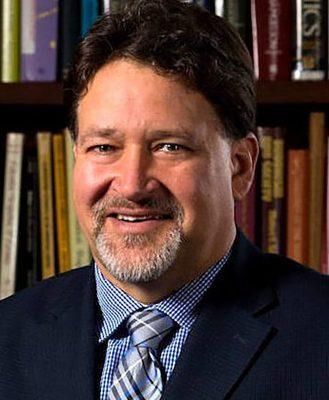Found within the buzz and festivities of Patriots’ Day this year was David Somers, chair of Boston University’s Department of Psychological & Brain Sciences, who ran the Boston Marathon for more than just a fast time.
After two of his three daughters were diagnosed with Type 1 diabetes and Somers was diagnosed with Type 2 diabetes, Boston’s Joslin Diabetes Center has been omnipresent in his life. In an effort to give back, Somers ran the marathon for diabetes research.

“This is a sort of recognition of my health, and my kids’ health,” Somers said. “Being able to pay it back to the institution that helped us the most so that they can help the next families that come along feels like the best way to really communicate that gratitude.”
Somers’ family first began to deal with diabetes around Halloween of 2002 when his youngest daughter, Ellie, was diagnosed with Type 1 diabetes at age three-and-a-half and spent multiple days in the hospital. Somers recalls having to monitor her blood sugar every two to three hours, even throughout the night.
“It’s pretty traumatic,” Somers said. “It’s like a bomb goes off and with diabetes, you sort of have to change the way you deal with everything.”
The next week Somers was at Joslin, which helped the family adjust to their new lifestyle.
“[Diabetes] is not a sprint, it’s a marathon,” Somers said. “It’s a long term, ‘How do I live with this? How do I manage this?’ ”
Joslin, the world’s largest diabetes center, takes an all-encompassing approach to diabetes treatment, according to Brenda Goodell, the center’s senior director of Development and Event Fundraising.
“[Diabetes] doesn’t just affect the person who’s diagnosed, it affects the family, it affects friends, it affects everyone,” Goodell said. “It’s 24/7, 365. You don’t get to take a vacation from it or a night off.”
Six years later, Somers immediately noticed a warning sign in his middle child, Anika, and measured her blood sugar levels, which were nearly triple the normal amount. He then called Joslin, set up an appointment and left with Anika’s type 1 diabetes diagnosis in time for the school dance that night.
In 2014, Somers himself was diagnosed with Type 2 diabetes, which caused significant changes to his lifestyle. He beat the disease, though his avoidance of the doctor’s office for a few years after led him to hospitalization in 2019 with undiagnosed high blood pressure and Type 2 diabetes once again.
Somers recalls the gruesome image of seemingly endless blood coming out of his eyes, nose and mouth.
“That kind of sent a wake-up call message,” Somers said. “I was lucky that the bleed was in my nose and not in my brain is the way I looked at it.”
While recovering and locked down during the COVID-19 pandemic away from home, Somers began to walk up the surrounding hills for hours every day. He eventually thought to himself, “Well maybe I’ll just start running,” once he moved back to Boston — a much flatter landscape.
When Somers began running, he was far from completing marathon distances, struggling to even run a half-mile. He kept building up his mileage before eventually hitting 18 miles and deciding it was time to run a marathon.
“Here’s a guy who has taken his passion and his dreams of a cure and put it into action … and he’s aggressively pursuing the kind of fundraising that fuels our research efforts,” Goodell said. “It’s one thing to write a check, it’s another thing to run a marathon or two or three.”
Somers had his sights set on the finish line near Copley Square for over 30 years when he first experienced Marathon Monday as a graduate student at BU in the late 80s.
“What I love about the Boston Marathon . . . you go from these elite athlete bodies to some really fit bodies and if you wait long enough, your neighbor will run by,” Somers said. “Like that doesn’t happen at the Super Bowl, your neighbor doesn’t get to play in the Super Bowl.”
Brianna Higgins, the Event Fundraising coordinator, spent months working with Somers before the race.
“It’s just fantastic to see them from start to finish throughout this entire process within the program and especially being able to cheer them on race day,” Higgins said.
Somers ended up raising over $11,000 for Joslin, exceeding his initial goal of $10,000 he set before the marathon.
Somers also plans to run the New York Marathon on Nov. 6 alongside his daughter Ellie to celebrate her 20th “diabirthday,” the anniversary of her diagnosis.
He crossed the finish line on Boylston St. with a personal record time of 04:29:36 at a pace of 10:17 minutes per mile.
“It really is an epic and iconic Boston experience, even better than I imagined,” he said. “I put my name on the front of my singlet and probably never went a minute after the 10 mile mark without someone shouting out my name in support … really just a memorable day.”
Correction: this article originally noted Somers’ pace in the marathon as 11:40, but his correct pace was 10:17. That change is now reflected.





















































































































Anele Mkhize • Apr 22, 2022 at 10:57 am
My son was diagnosed diabetes 2008. He is in his late 30’s. He urinate a lot, usually during the night and his blood sugar was 600. I do not know where he could have inherited it. Since then I have worked on finding a good way to control it or reverse it. and I was introduced to Tree of Life Herbal Clinic and ever seem My son started using diabetes herbal formula I purchased online from Tree of Life Herbal Clinic November last year. After 5 weeks of usage, his diabetes was totally reversed, blood sugar now normal and his last A-1C was 4.0 perfect. To know more about Tree of Life Herbal Clinic visit w w w. treeoflifeherbalclinic .com